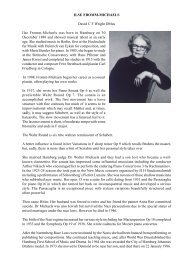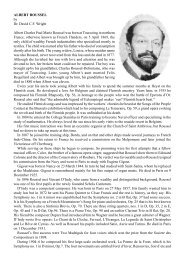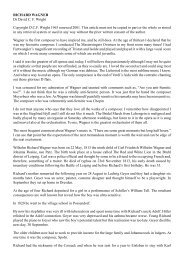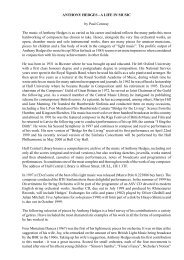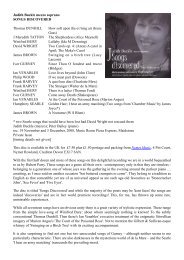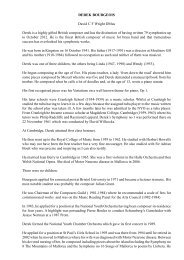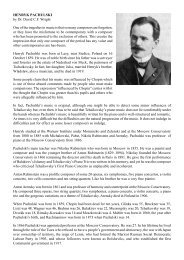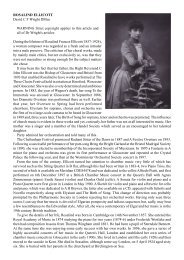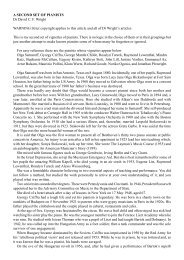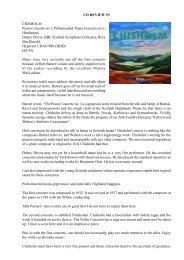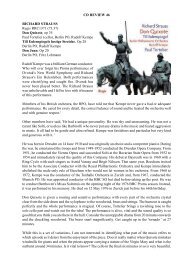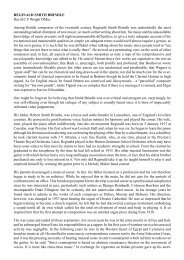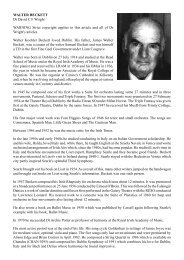CD Review 85 Rubinstein and Rachmaninov ... - Dr David Wright
CD Review 85 Rubinstein and Rachmaninov ... - Dr David Wright
CD Review 85 Rubinstein and Rachmaninov ... - Dr David Wright
- No tags were found...
You also want an ePaper? Increase the reach of your titles
YUMPU automatically turns print PDFs into web optimized ePapers that Google loves.
RUBINSTEINPiano Concerto no 4 in D minor Op 70;RACHMANINOVPiano Concerto no 3 in D minor Op 30.Joseph Moog (piano)Deutsche Staatsphilharmonie Rhinel<strong>and</strong>-Plate,Nicholas MiltonONYX 4089 (69.49)<strong>CD</strong> REVIEW <strong>85</strong>Joseph Moog is an award-winning pianist of amazingtechnical skill. He has won great acclaim for hisrecordings of the Liszt concertos. And this <strong>CD</strong> willenhance his reputation even further.The joy of this <strong>CD</strong> is the <strong>Rubinstein</strong> Piano Concerto no.4 which is an astonishing piece.<strong>Rubinstein</strong> was a Russian Jew who lived from 1829 to 1894 <strong>and</strong> was an amazing pianist. He was aprolific composer of six symphonies, five piano concertos ten string quartets, four piano sonatas, fivepiano trios, two cello sonatas, the opera The Demon <strong>and</strong> the quasi-opera Christus. His brother Nickolaiwas director of the Moscow Conservatory <strong>and</strong> allegedly had altercations with Tschaikovsky.Anton <strong>Rubinstein</strong> was a brilliant pianist touring with his pianistic displays. All the other famousinstrumentalists of the time who worked with him unanimously spoke of his breathtaking talent<strong>and</strong> musicality.Listening to this <strong>Rubinstein</strong> shows how clearly he influenced Tschaikovsky <strong>and</strong> <strong>Rachmaninov</strong>. WhileI like the piano concertos of Tschaikovsky I wonder if he would have written them quite like this hadit not been for <strong>Rubinstein</strong>.The <strong>Rubinstein</strong> was the concerto of the second half of the nineteenth century <strong>and</strong> is a stunning workof staggering virtuosity <strong>and</strong> lyrical beauty. The first movement is marked Moderato assai but it isreally a very fast movement. There are chords of five notes in each h<strong>and</strong> <strong>and</strong> marvellous dissonances.Without dissonances you would not get the drama, tension <strong>and</strong> excitement as in this concerto. Thegymnastics of the cascades <strong>and</strong> arpeggios are electrifying ad not just padding as in some composers.This movement is in coherent sonata form with two gorgeous melodies <strong>and</strong> which are not unlike thoseof <strong>Rachmaninov</strong> 3, composed many years later. And how well <strong>Rubinstein</strong> develops the material.There are composers who are adored who simply could not do this.The material is memorable <strong>and</strong> durable <strong>and</strong> of the highest order. The slow movement, Andante, doesnot drag or languish. It has wonderful themes <strong>and</strong> more compelling dissonances. The finale is markedallabreve but is scintillating.Some will dismiss it as a warhorse but that was said of Tschaikovsky's Piano Concerto no 1. <strong>Rubinstein</strong>'sconcerto has been described as turbulent work very often played but now comparatively forgotten.I know many concert pianists who rubbish this concerto <strong>and</strong> say that they will never play it. If thetruth were told they would not be able to play it. This pianist can <strong>and</strong> I have to commend the orchestrafor their fine contribution <strong>and</strong> some of the woodwind solos are exquisite.
It seems that all young pianists are playing the show pieces such as the Liszt Sonata, Prokofiev three<strong>and</strong> <strong>Rachmaninov</strong> three. Some of them do very well <strong>and</strong> some lack the musicianship in order to favourthe technique.One very great pianist said that you have to be 40 to underst<strong>and</strong> <strong>and</strong> play these works well.I have a few reservations about the performance of the <strong>Rachmaninov</strong>. The pianist's skill <strong>and</strong> ability arenot in question, but the opening is a little too fast. It needs mores space so that the music can speak asit certainly does in the Ashkenazy/Fistourali version <strong>and</strong>, in this performance, the lower brass make amess of the growls. Listen to Bryon Janis with Antal Dorati to see how it should be done, The musicthen races, almost, but not quite of out control, as if this was the 2,30 from Newmarket. Thisinterpretation is a Formula 1 Mercedes racing at 180mph. At times, one is convinced that thisperformance is technique more than music. There are a few timing issues particularly in the lastmovement <strong>and</strong> some unauthorised rubatosThe spirituality of the slow movement is lost.The speed of the finale is excessive <strong>and</strong> exhausting.To hear the authentic speeds watch Yefim Bronfmann on You Tube.But the playing is staggering.© COPYRIGHT <strong>David</strong> C F <strong>Wright</strong> DMus 2012. This article or any part of it, however small,must not be copied, quoted, reproduced, downloaded or altered in any way whatsoever nor storedin any retrieval system. Failure to comply is in breach of International Copyright Law <strong>and</strong> willrender any offender liable to action at law.If anyone in the UK particularly has difficulty obtaining any <strong>CD</strong>s will they please contact RecordCorner, Godalming, Surrey, telephone 01483 422006 <strong>and</strong> ask for Tom Briggs or his staff.



